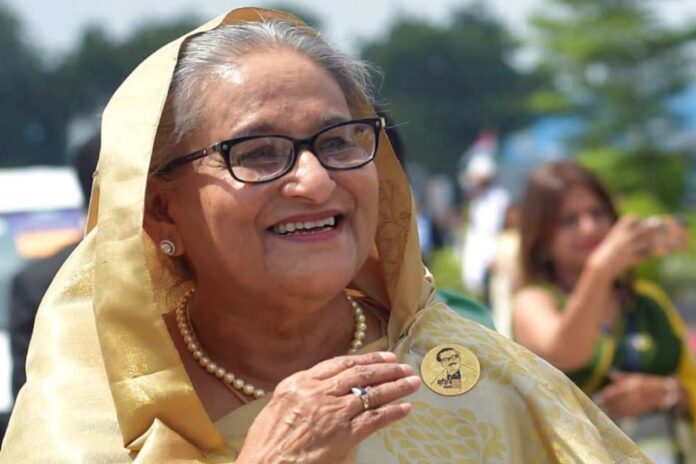Sheikh Hasina’s prolonged stay in India has sparked considerable debate regarding its implications for India-Bangladesh relations. Hasina, the former prime minister of Bangladesh, fled her country in the face of a violent uprising in August and has since been residing in India. Bangladesh, seeking her return for alleged crimes against humanity, has formally requested her extradition. However, India has chosen to remain silent, raising questions about whether her stay is a liability for India or strategic leverage in the complex diplomatic landscape between the two neighbouring nations.
Sheikh Hasina Prolonged Stay: A Silent Diplomatic Standoff
The Indian government’s refusal to comment on the extradition request has left many geopolitical analysts speculating about the long-term impact of Hasina’s presence in India. While some argue that her prolonged stay could become a diplomatic burden for India, others view it as a bargaining chip that can be used strategically in the future. According to Article 6 of the India-Bangladesh extradition treaty, India has the option to refuse extradition if the offence is deemed political. This clause provides India with significant flexibility, allowing New Delhi to interpret the nature of the charges brought against Hasina.
Hasina, wanted in Bangladesh for alleged genocide and crimes against humanity, is currently staying at an undisclosed location in India. The request for her extradition has come from Bangladesh’s International Crimes Tribunal (ICT), which Hasina’s own government established to address atrocities committed during the Bangladesh Liberation War. The charges against Hasina are related to the violent suppression of student-led protests, which occurred under her rule. Ironically, the tribunal issuing the arrest warrants was formed by Hasina’s Awami League government, raising questions about the political motivations behind the request.
Political Context: The Bangladesh Jamaat-e-Islami Connection
The political context surrounding the extradition request adds another layer of complexity. Hasina’s government had banned the Bangladesh Jamaat-e-Islami party, a staunch opponent of her regime, during the height of the protests. The ban was lifted after the interim government took power, leading to speculation that Jamaat-e-Islami affiliates may have undue influence over the ICT. Former Indian diplomats have pointed out that some individuals associated with the tribunal may have ties to the Jamaat-e-Islami, casting doubt on the impartiality of the proceedings.
One former high commissioner to Bangladesh remarked, “The Jamaat-e-Islami might claim to have a changed character now, but its funding sources remain questionable. Rulings made by individuals close to the Jamaat are likely to be politically motivated.” This underlines the view that the extradition request may be politically charged, as Bangladesh’s domestic politics continue to play a role in the extradition process.
India’s Strategic Position: A Diplomatic Leverage?
India’s silence on the matter can be seen as a careful diplomatic maneuver. While Hasina is widely regarded as pro-India, her long-term stay could be perceived as a liability, especially in the context of Bangladesh’s changing political dynamics. Some experts argue that Hasina’s presence provides India with leverage over Bangladesh’s new interim government, led by economist Muhammad Yunus. Yunus, whose government has received support from the West, has a fraught history with Hasina. Both leaders have publicly criticized each other in the past, and their relationship remains tense. With Hasina in India, India potentially holds significant diplomatic leverage over the interim government.
The Yunus-led interim government has made it clear that it seeks a balanced and mutually respectful relationship with India, unlike during Hasina’s tenure, when ties were often viewed as one-sided. Shafiqul Alam, the press secretary to Yunus, expressed concerns that some factions in India have not yet accepted Hasina’s ouster, which has led to a sense of mistrust between the two nations. He said, “During Sheikh Hasina’s rule, our relationship with India was unidimensional. The interim government doesn’t want that. Our relationship with India must be of equals, of mutual respect and trust.”
The US Factor: How Global Politics Plays a Role
The involvement of international powers like the United States also shapes the dynamics of the situation. On December 24, the press wing of Yunus’s office reported that US National Security Advisor Jake Sullivan had reiterated Washington’s support for Bangladesh. This added layer of international support for the Yunus government puts additional pressure on India to recalibrate its approach toward Bangladesh. Experts believe that India must carefully navigate these shifting allegiances in order to maintain its influence in the region.
The Future of India-Bangladesh Relations
As India watches closely, the next steps in the Hasina case will have far-reaching implications for the future of India-Bangladesh relations. Harsh Vardhan Shringla, a former foreign secretary of India, highlighted the need for India to work on multiple fronts to adapt to the new political landscape in Bangladesh. This will involve balancing the delicate relationship with the Yunus-led interim government while also considering the strategic benefits of Hasina’s presence in India.
In the coming months, it remains to be seen whether India will officially reject Bangladesh’s extradition request or use Hasina’s stay as a bargaining tool in future diplomatic negotiations. Regardless of the outcome, India’s handling of this issue will play a significant role in shaping the course of India-Bangladesh relations in the post-Hasina era.

